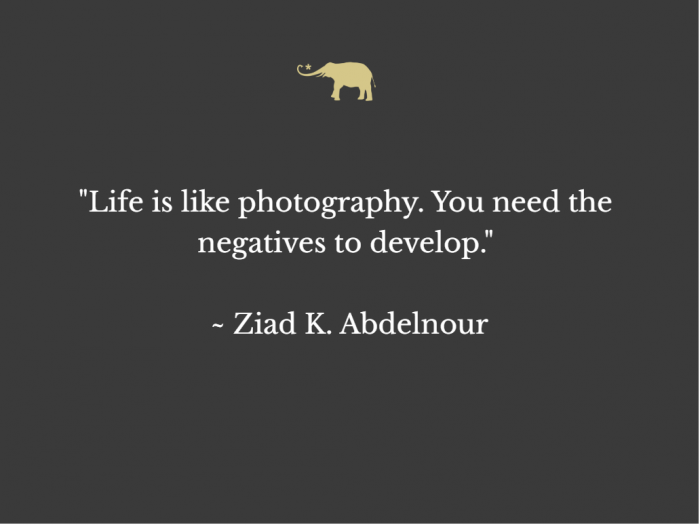“I think life would be much better if I didn’t exist.”
No other sentence crossed my mind so often as that. As a woman who’d had the desire to take her own life since the age of 10, this declaration was almost like playing a catchy pop song a zillion times.
However, this event was different—it seemed like a demon was eating me from the inside:
I remember compulsively crying in my room on a hot Brazilian Saturday. I’d lost my passion for drafting my novels, my writing career was going nowhere, and boring was the best word to describe my long-term relationship. I was broke, living in my mom’s house, and had no idea what I should do with my life.
Fighting against myself almost every day was exhausting. I felt shame for being clueless about my next steps while younger people conquered the world. I was tired of my existence.
Of course, the situation didn’t get to this point overnight. Everyone carries heavy baggage through their life journey, and I wasn’t different.
My parents raised me to be the perfect daughter: good grades, excellent behavior, and no boyfriend until I graduate from college. My dad, especially, used to yell every time I didn’t follow his rules.
Emotional support is something I didn’t have in my home. My parents worked all day long, so I basically lived alone. And you may think I could have at least talked to some friends, right? No, I couldn’t. As an introvert and nerdy girl, I was more used to craving that attention than getting it. When I did, it usually came from the popular girls—but their intentions were far from good.
My best friends didn’t treat me well. I was often left with my heart bleeding, feeling inadequate—and eventually, I closed myself to everything but the shadowy world within me.
All the pain I carried through the years brought disturbing consequences. Depression and anxiety started to creep in, making me want to disappear. Trust became a word that wasn’t featured in my dictionary. A mix of anger and pain danced their unappealing dance within me.
The path I walked led me to the darkness. And it led me to the unfortunate moment I mentioned earlier.
But, it also helped me to remember I have two weapons that support me in troublesome times: my writing and imagination.
Moved by an unexplained force, I opened the editor on my laptop. I furiously typed a short story about an unknown character who was about to take their life with a knife; a brief inner dialogue with their consciousness prevented them from concluding the act. I finished the tale in about 10 minutes, and it was one of the most liberating things I did in life.
By filling the paper with my anguish, I was able to let go of what was torturing me, even for a moment. It was the first step in healing the open wounds carved into my heart.
In 2017, I discovered morning pages through Julia Cameron’s book, The Artist’s Way.
The realization that journaling can make us more creative and self-aware fascinated me. It didn’t take long for me to embark on a journey of healing and self-knowledge.
Writing in journals allowed me to access and accept the parts of my life I was trying to hide. Through endless journaling sessions, I learned that, sometimes, we need to dive into the discomfort to prepare ourselves to live a smooth and meaningful life.
Facing your demons isn’t easy. While doing so, you will cry, get angry, and suffer—a lot. Nonetheless, to heal what has harmed us, we have to face the core of the problem. This way, we will let go of what no longer serves us. This way, we get to be free.
Healing through journaling doesn’t substitute the help of mental health professionals. Nonetheless, it can help us to understand ourselves better, and discover what matters in our lives.
Since I started journaling, I’ve gained more clarity and self-awareness. Sometimes I still struggle with my internal battles, but now I can be more understanding and compassionate with myself. I almost never play the victim role anymore; instead, I’m my own heroine.
I’ve listed some tips below to help you to start using journals in your healing journey.
Be here now:
Journaling is a mindful activity. It requires a significant level of presence to go within and vent your thoughts and feelings on paper.
Before writing, meditate for 10 or 15 minutes. Meditation is a great tool to ease your mind and let you connect with your essence.
Feel whatever you need to feel:
Sometimes we censor our feelings because we judge them as disgusting and painful. If we desire to get in touch with the thing that is disturbing us and recover from it, the best thing we can do is to enable our feelings to flow.
Remember a hurtful event. How does it make you feel? Throw all you’re sensing onto the paper.
Start with a sentence:
Don’t overthink. Write the first thing that comes to your mind. “I’m angry with my husband” or “I’m hungry” may seem irrelevant but can reveal a lot about what is going on with us.
Always ask why:
“Why” is the key question. If you wrote about being angry with your husband, ask yourself why and keep on journaling. Soon, you will be ready to reach deep layers within yourself and understand why it causes you so much pain.
Keep breathing:
Being vulnerable on paper can be overwhelming. Take a deep breath and realize you will be okay no matter what. As Ariana Grande would sing, “Just keep breathin’ and breathin’ and breathin’ and breathin’. And oh, I gotta keep, keep on breathin’.”
See the situation from another perspective:
Everyone is going through something—and often, we have no idea. Most of the time, we can use what we learn to propel ourselves forward. Or, we can learn from others’ situations.
What triggers us can be a blessing in disguise. If we hadn’t divorced our cheating husband, we wouldn’t have met the love of our life. If we’d stayed in that crappy job, we wouldn’t have had the courage to go after our dreams.
Forgive and let it go:
I know some situations can mark your life for a long time. Still, you don’t need to carry this burden on your shoulders forever. Realize your value doesn’t lay in what happened to you, but on who you choose to be now.
Forgive yourself and others. You can do this, regardless of how arduous this task can be. There is no need to rush; trust your process and walk on the path of anything that makes you happy now.
Ready to journal?
Journaling for healing can be uncomfortable, challenging, and frustrating, but it’s worth it. It benefits me every day, and I know it can do wonders for you. Give it a chance and watch your life slowly transform.












Read 3 comments and reply